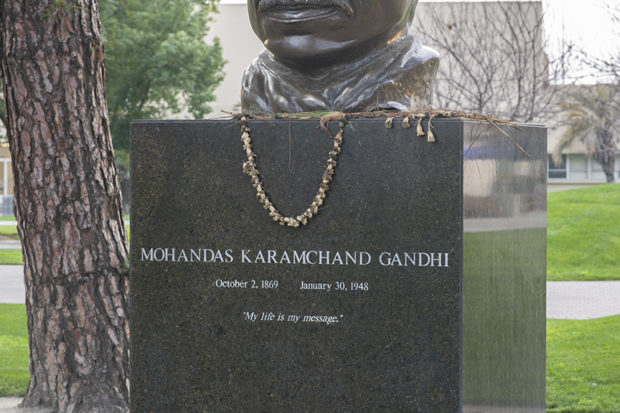
By Jonathan D. Greenberg and Sudarshan Kapoor
On Jan. 26, the Republic Day of India, a bronze statue of Mohandas K. Gandhi that had been given to the City of Davis as a gift by the government of India was attacked by unknown persons who sawed part of the statue. We condemn the desecration and decapitation of the Gandhi statue as an attack on the nonviolence principles Gandhi advocated and represented in his life’s work, and we hold dear.
The methods of nonviolent resistance that Gandhi practiced and embodied enabled the people of the Indian subcontinent to end 200 years of British colonialism.
Rev. Martin Luther King, Jr., frequently proclaimed his conviction that Gandhi’s practice of nonviolent resistance revealed “the most potent weapon available to oppressed people in their struggle for justice and human dignity.” This potent weapon was used by citizen activists and their allies to end nearly a century of Jim Crow apartheid in the United States.
James Lawson, perhaps the most important nonviolence teacher of the Black Freedom Movement in the United States, studied Gandhian thought in India and applied the principles and methods he learned to the racist social reality in the American South.
To Lawson, “[t]he discovery of what Mohandas K. Gandhi called the philosophy and politics of nonviolent direct action is akin in impact and meaning to that of Albert Einstein’s discovery of the theory of relativity.”
Gandhi’s participation in the anti-racist movements as a young lawyer in South Africa, and his leading role in the liberation of people of all faiths in India, had a great impact on Nelson Mandela. Reflecting on Gandhi’s life and example, Mandela reflected: “He is the archetypal anticolonial revolutionary.
“His strategy of noncooperation, his assertion that we can be dominated only if we cooperate with our dominators, and his nonviolent resistance inspired anticolonial and antiracist movements internationally in our century.”
We understand that Gandhi has always been a controversial figure, and he remains so in the 21st century. A flawed human being, a person full of contradictions, Gandhi is beloved by millions, while he is criticized and perhaps despised by many others, and for a multitude of reasons. For example, many people have highlighted racist statements Gandhi made when he was a young lawyer and activist in South Africa.
Indeed, Nelson was well aware of these racist statements. However, Mandela argued, “Gandhi must be forgiven those prejudices and judged in the context of the time and circumstances. We are looking here at the young Gandhi, still to become Mahatma, when he was without any human prejudice save that in favor of truth and justice.”
Anyone holding sincere concerns or disagreements regarding this preeminent icon of nonviolence has a right to voice their views, a right we strongly defend. But just as strongly we oppose any and all violent acts that perpetuate hatred, animosity and trauma.
Those who oppose Gandhi, or any other important figure alive or dead, should demonstrate their opposition nonviolently, offering the same respect they would want for themselves and those for whom they care.
The urgent need for nonviolent forms of speech and expression is highlighted by recent political violence that has exploded in the United States, India and throughout the world.
We can never expect violent acts to lead to peaceful solutions. It is only through education, dialogue and understanding that seek reconciliation that we can obtain a peaceful resolution of our differences and disputes. We invite those who hold concerns to join us in a peaceful discourse of our disagreements.
Cesar Chavez, the iconic leader of the United Farm Workers, also regarded Gandhi as a great teacher, for whom he expressed a spiritual and political debt. Following the destruction of the Gandhi statue in Davis, his son, Paul F. Chavez, president of the Cesar Chavez Foundation, spoke out to condemn the attack and learn from it to pursue a peaceful way of resolving our differences.
We support Chavez’s call to nonviolence and peaceful dialogue to heal our shared wounds and build the beloved community and symphony of brotherhood as Dr. King envisioned.
In addition, in the spirit of Gandhian and Kingian nonviolence, we affirmatively reach out to all of those who have grievances related to Gandhi to meet with us in a peaceful dialogue based on mutual respect, honest expression and deep listening to expand our appreciation of underlying concerns and move toward greater understanding and reconciliation.
*****
Jonathan D. Greenberg is the director of the USF Institute for Nonviolence and Social Justice at the University of San Francisco. Sudarshan Kapoor, Ph.D. is an emeritus professor at Fresno State and a peace activist.
